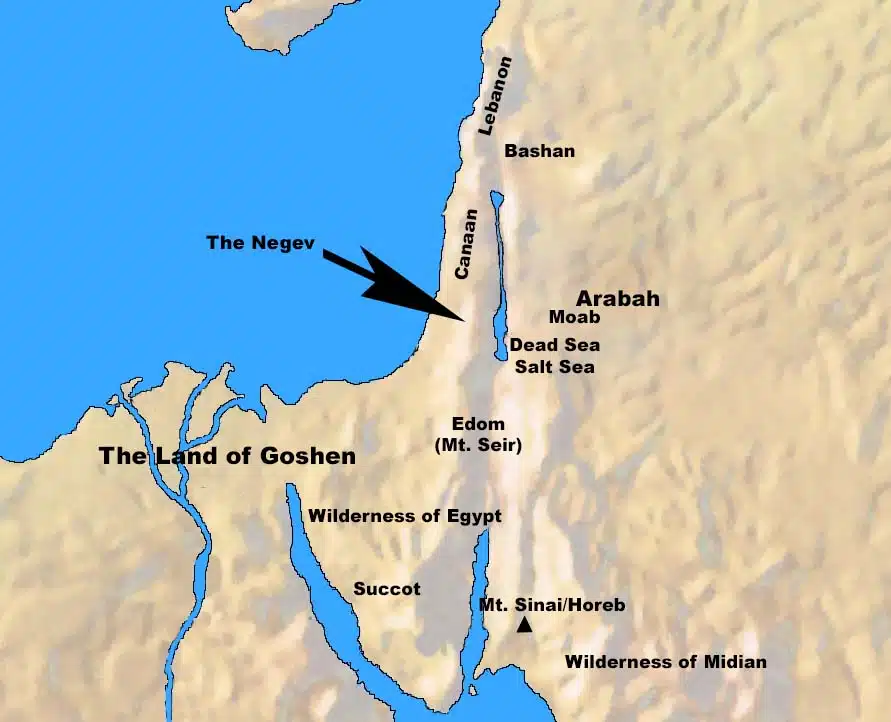Moses recounts Israel’s history after leaving Egypt. He begins by reminding the Israelites of God’s command to leave Mount Horeb, where they received the Law, in order to go and conquer the Promised Land.
This section begins with the covenant name of God, the LORD (or Yahweh). This is the name that God gave to Moses at the burning bush event at Mount Horeb (Exodus 3). One important feature to note in verse 6 relates to the issue of syntax in biblical Hebrew, the primary language in which the Old Testament was written. Normally, the word order in Hebrew is verb-subject-direct object. But Moses began with the subject (the LORD) to emphasize that it is the LORD who spoke to His people at Horeb. Stated differently, Moses wanted his listeners to know that what he was about to say did not come from him, but from the Suzerain, or Ruler (God) who has full authority over His vassals (the Israelites).
The LORD had commanded His people to leave Horeb and described with precision the geographical path to take once they resumed their journey. In this description, we see various places listed and it helps to understand their geographical location. Whereas the hill country of the Amorites refers to the central mountain range which run south to north, their neighbors in the Arabah refers to areas north of the Dead sea (Deuteronomy 11:30; Joshua 8:14). The hill country includes the territory of the Hittites, Jebusites, Amalekites, Canaanites, and Perizzites (Numbers 13:29).
The lowland (literally, the Shephelah) describes the hills between the Judahite region and the Mediterranean coastal plain, as seen in Joshua 15:33-44. The Negev, the dry country, is the wilderness southern part of Israel. The seacoast refers to the Mediterranean coast on the west side of Israel. The land of the Canaanites can refer to most of the promised land at the time of the exodus. However, after Joshua’s conquests the Canaanites were pushed to the north around the Jezreel Valley. The Lebanon speaks of the inland mountain range including Mount Hermon. The great river, the river Euphrates is an indication of the northwestern side of the river in northern Syria, the northern border of the land that God has promised to His people.
After describing all these places, the LORD commanded His people to take possession of the land of Canaan that God had granted to Abraham, Isaac, and Jacob, as well as to their descendants. God had granted, now it was Israel’s responsibility to possess what God had given. These three verses teach us two important lessons: (1) Israel’s covenant God (the LORD) is the possessor of all the earth and is the one who gives freely according to His divine will; and (2) the LORD is a faithful and covenant-keeping God. He will make clear in Deuteronomy the gifts He has given, and the people’s responsibility to possess and enjoy the benefit of those gifts. This is the way God operates throughout scripture. He gives gifts to humans, but often leaves humans a choice, a responsibility, to talk in obedience to Him in order to possess the benefit He has granted.
Biblical Text
6 “The Lord our God spoke to us at Horeb, saying, ‘You have stayed long enough at this mountain. 7 Turn and set your journey, and go to the hill country of the Amorites, and to all their neighbors in the Arabah, in the hill country and in the lowland and in the Negev and by the seacoast, the land of the Canaanites, and Lebanon, as far as the great river, the river Euphrates. 8 See, I have placed the land before you; go in and possess the land which the Lord swore to give to your fathers, to Abraham, to Isaac, and to Jacob, to them and their descendants after them.’
Check out our other commentaries:
-
Deuteronomy 16:16-17 meaning
The celebrations of the Feast of Unleavened Bread, the Feast of Weeks and the Feast of Booths every year at the central sanctuary are summarized....... -
Genesis 25:31-34 meaning
Jacob proposes to Esau that he sell him his birthright in exchange for the stew. Esau is so hungry that he doesn’t care about his...... -
Matthew 10:24-25 meaning
Jesus informs His disciples that they will not be greater than Him, but they can be like Him. This likeness (and their greatness) will come...... -
Galatians 4:12-16 meaning
Paul urges the Galatians to return to his teaching. He reminds them that they were loving and respectful to him when he met them. Paul...... -
Daniel 7:15-18 meaning
Daniel asks for an interpretation of this bizarre vision. An Interpreter tells him the four beasts are four kings on the earth who will fade......




